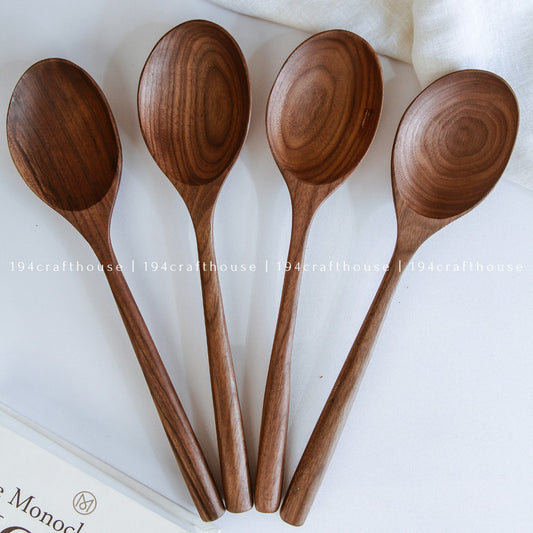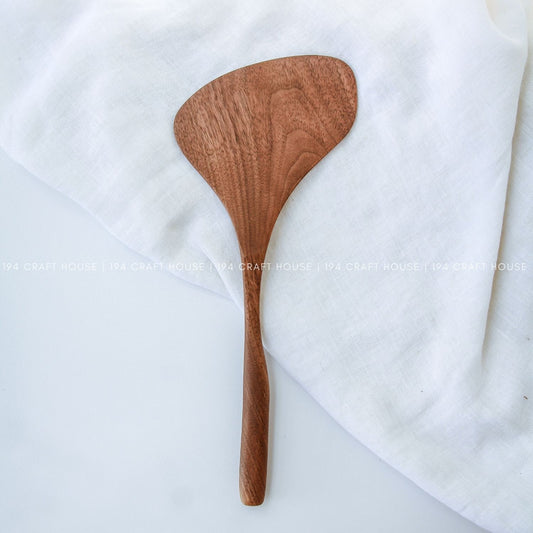Wooden kitchen utensils add an unparalleled sense of rustic charm and coziness to your culinary field. Not only are these traditional objects aesthetically pleasing, environmentally sound, and long-lasting, but they also bring the beauty quotient while making cooking or dining easier with them by your side at all times.
However, to maintain their appearance, functionality, and hygiene, proper cleaning and care are essential.
In this comprehensive guide, we'll explore everything you need to know about cleaning and caring for wooden utensils to ensure their longevity and safe use in your kitchen.
The Importance of Cleaning Wooden Utensils
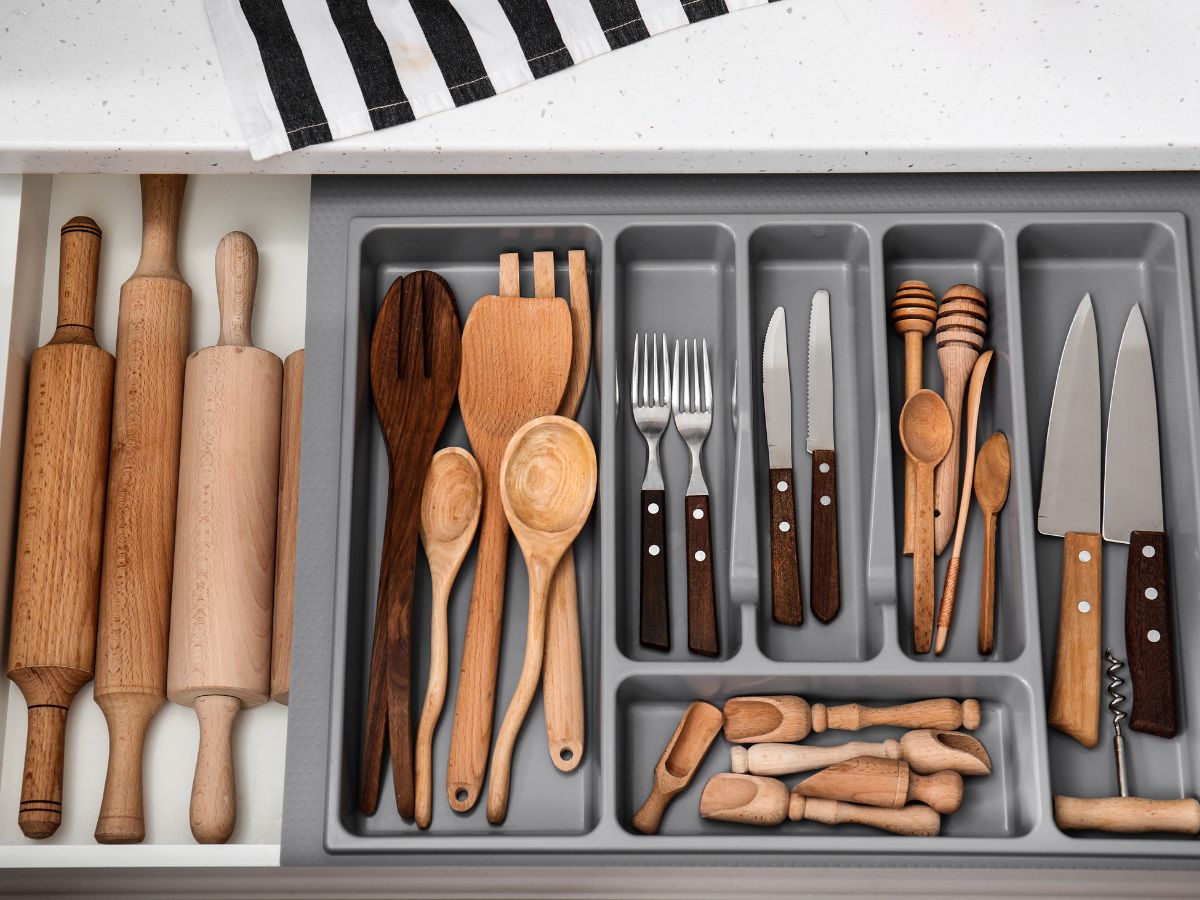
Cleaning wooden utensils is essential for maintaining hygiene, preventing mold growth, and preserving their appearance and functionality. By understanding the significance of proper cleaning, recognizing the risks of improper cleaning, and emphasizing gentle cleaning methods, you can ensure the longevity and performance of your cherished wooden utensils.
Read this article: 194+ Different Types of Spoons and Their Uses With Image
Step-by-Step Guide to Cleaning Wooden Utensils
1. Hand Wash Only
Many of our customers ask us if wooden spoons or wooden utensils can be washed in the dishwasher.
And the answer is always "No"
Wooden utensils should never be washed in a dishwasher due to the risk of warping and cracking primarily because of the harsh conditions present in dishwasher cycles.
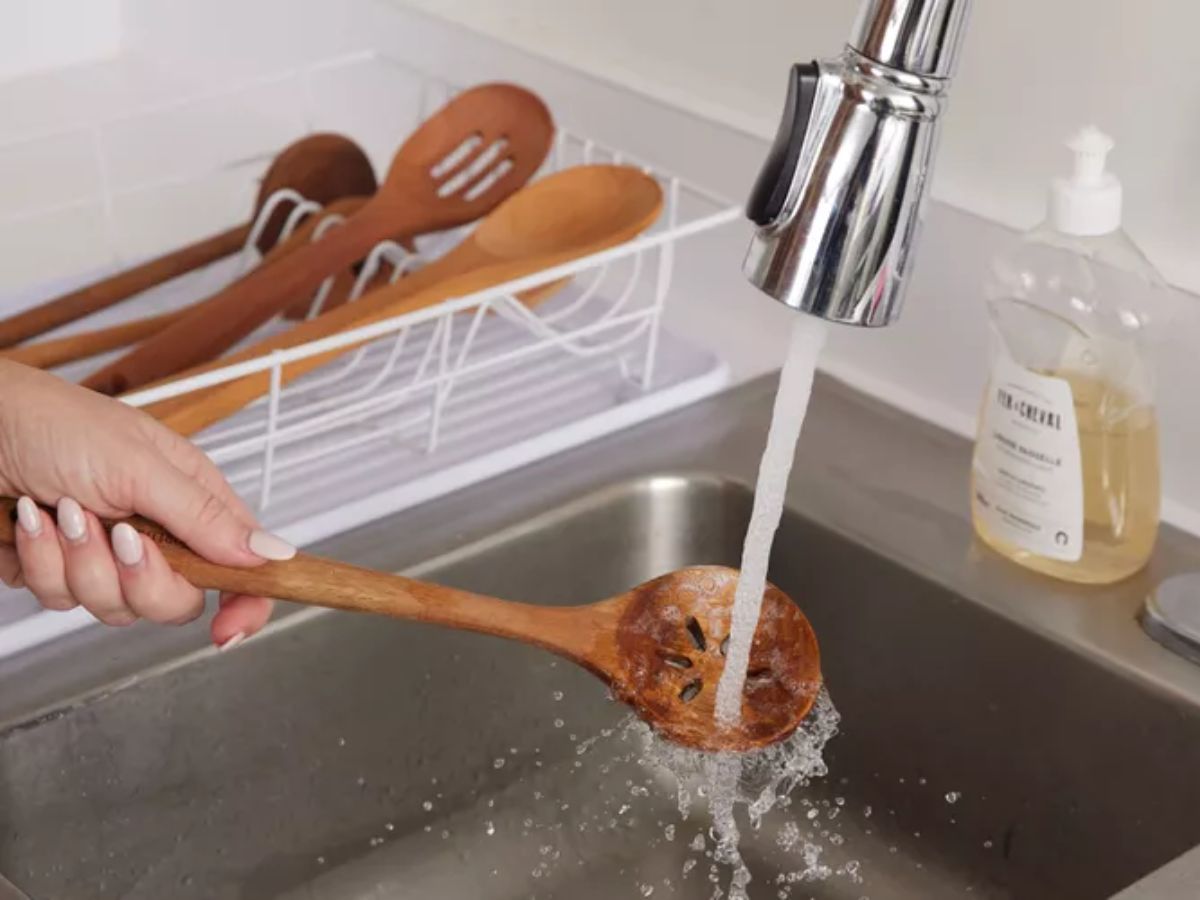
Here's a detailed explanation:
- High Heat Exposure: Dishwashers use hot water and steam during their cleaning cycles. The high temperatures generated inside the dishwasher can cause wooden utensils to absorb excessive moisture, leading to swelling and warping of the wood fibers. This can result in misshapen utensils that may no longer be functional or aesthetically pleasing.
- Moisture Absorption: Wooden utensils are porous, meaning they can absorb water easily. In a dishwasher, the combination of hot water, steam, and prolonged exposure to moisture can cause wooden utensils to absorb more water than they would under normal washing conditions. This can result in swelling of the wood, leading to structural damage and potential cracking.
- Detergent Exposure: Dishwasher detergents often contain harsh chemicals and abrasive ingredients designed to remove tough stains and grease from dishes. These detergents can strip the natural oils and finishes from wooden utensils, leaving them vulnerable to damage and discoloration. Additionally, the abrasive action of dishwasher jets can further exacerbate this effect, leading to scratches and surface wear.
- Agitation and Friction: The mechanical action of dishwasher jets and the movement of utensils during the wash cycle can subject wooden utensils to significant agitation and friction. This can cause abrasion and wear on the wood surface, weakening its structural integrity and increasing the likelihood of cracks or splinters forming over time.
- Incompatibility with Dishwasher Racks: Wooden utensils may not be designed to withstand the rigors of dishwasher racks, which are typically made of metal or hard plastic. Placing wooden utensils in the dishwasher can result in them being knocked around or trapped in the rack's grids, leading to damage or breakage.
In summary, the combination of high heat, moisture, harsh detergents, agitation, and incompatibility with dishwasher racks makes washing wooden utensils in a dishwasher highly risky.
2. Use Mild Soap
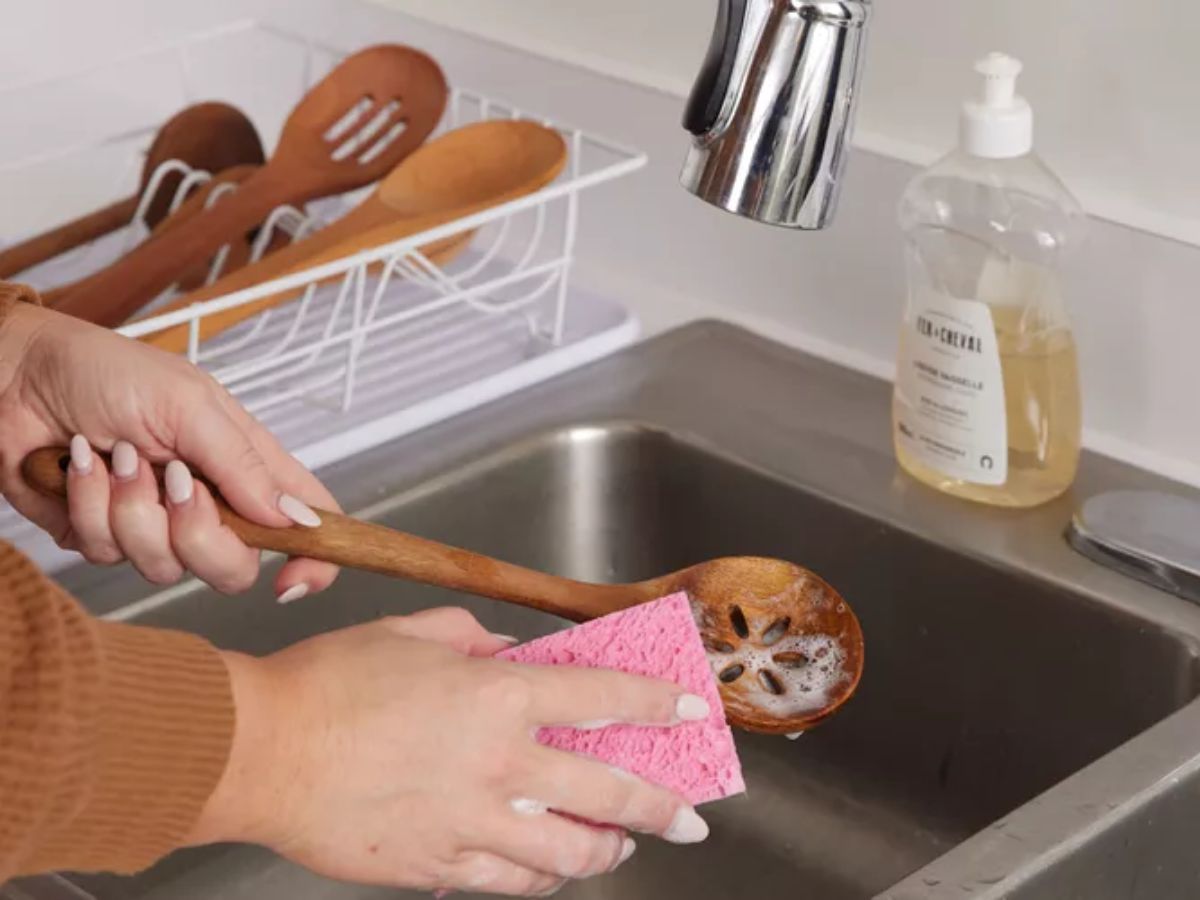
When it comes to cleaning wooden utensils, the choice of soap matters greatly. Here's why opting for mild dish soap and warm water is the best approach:
- Gentle on Wood: Mild dish soap is formulated to be gentle on surfaces, making it ideal for cleaning delicate materials like wood. Unlike harsh detergents, which can strip away the natural oils and finishes of wooden utensils, mild soap helps to remove food residues and bacteria without causing damage.
- Effective Cleaning: Despite being gentle, mild dish soap is still effective at cutting through grease and grime, ensuring that your wooden utensils are thoroughly cleaned. When combined with warm water, mild soap helps to loosen stubborn food particles and stains, making them easier to remove.
- Safe for Food Contact: One of the most important considerations when choosing soap for cleaning wooden utensils is ensuring that it is safe for food contact. Mild dish soaps are specifically formulated to be non-toxic and food-safe, giving you peace of mind that no harmful residues will be left behind on your utensils.
- Avoids Residue Buildup: Using mild soap helps to prevent residue buildup on wooden utensils, which can affect their appearance and performance over time. By rinsing thoroughly after washing with mild soap, you can ensure that no soapy residue remains on the utensils, keeping them clean and hygienic.
- Preserve Finish: Unlike harsh detergents, which can strip away the protective finish of wooden utensils, mild soap helps to preserve the wood's natural oils and finishes. This helps to maintain the integrity and appearance of the utensils, ensuring that they continue to look their best for years to come.
In summary, using mild dish soap and warm water for hand washing wooden utensils is recommended because it is gentle yet effective, safe for food contact, and helps to preserve the wood's natural finish. By incorporating this gentle cleaning method into your routine, you can ensure that your wooden utensils remain clean, hygienic, and in top condition for all your culinary needs.
3. Scrub Gently
Properly scrubbing wooden utensils is essential for removing food residue and stains without causing damage to the wood. Here's how to do it effectively:
- Choose the Right Scrubber: Opt for a soft sponge or dishcloth when scrubbing wooden utensils. Avoid abrasive scrubbers or brushes, as they can scratch or damage the wood's surface. The goal is to gently remove food residue and stains without causing undue wear and tear on the utensils.
- Use Light Pressure: Apply light pressure when scrubbing wooden utensils to avoid damaging the wood fibers. Allow the softness of the sponge or dishcloth to do the work, gently lifting away food particles and stains without scrubbing too aggressively.
- Work in the Direction of the Grain: When scrubbing wooden utensils, always work in the direction of the wood grain. This helps to prevent any potential damage to the wood fibers and ensures a more effective cleaning process.
- Address Stubborn Stains Carefully: For stubborn stains or dried-on food residue, dampen the sponge or dishcloth with warm water and a small amount of mild dish soap. Gently scrub the affected area, taking care not to apply too much pressure. Avoid using harsh chemicals or abrasive cleaners, as they can damage the wood.
4. Rinse Thoroughly
Thorough rinsing is essential to ensure that wooden utensils are free from soap residue and any remaining food particles.
Proper rinsing is an essential step in maintaining hygiene and preventing contamination, ensuring that your culinary creations are prepared and served with the highest standards of cleanliness and safety.
5. Pat Dry
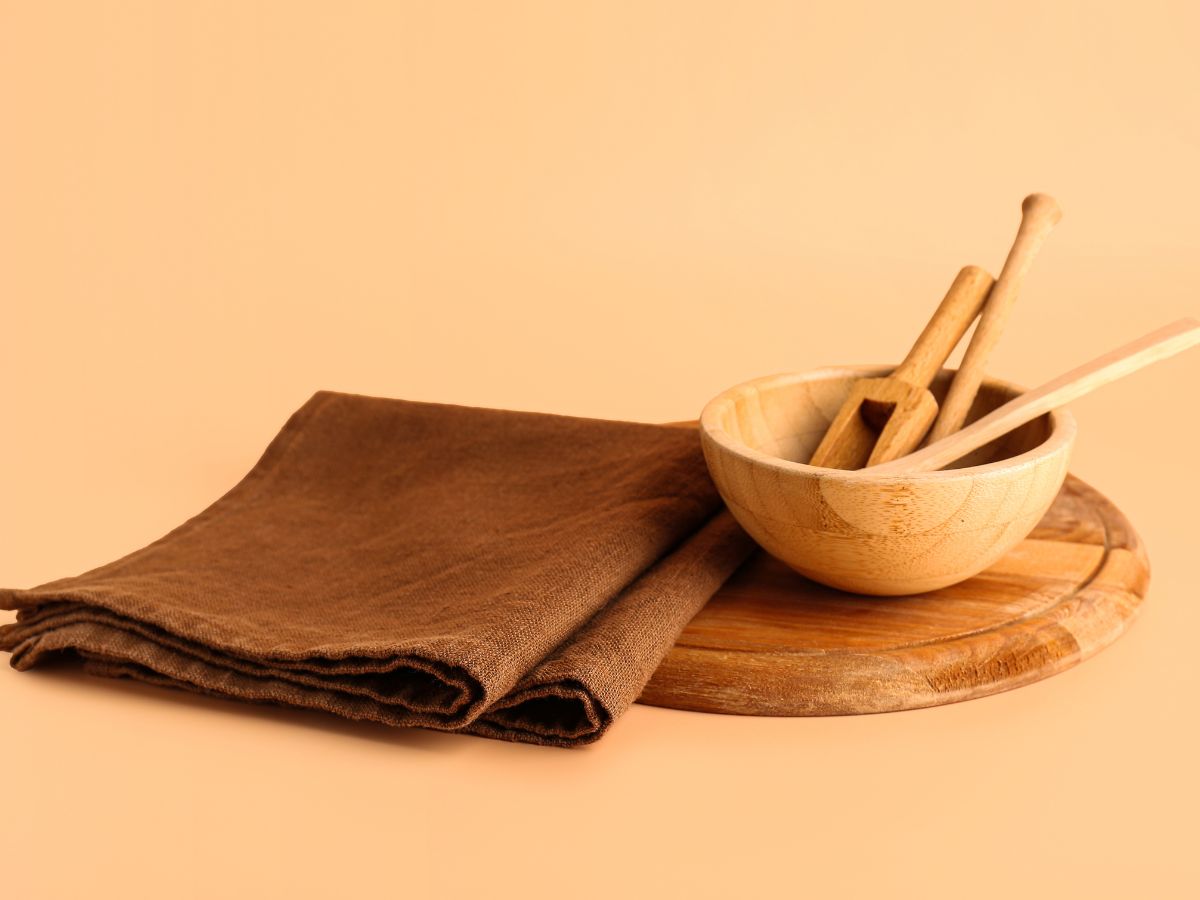
To effectively pat dry wooden utensils, follow these steps:
- Use a Clean Towel: Choose a clean, lint-free towel for drying wooden utensils. Avoid using towels that may be dirty or have been used for other purposes, as this can introduce contaminants to the utensils.
- Gently Wipe Dry: After washing, use a clean towel to gently wipe the surface of the wooden utensils, removing any moisture or water droplets. Be thorough but gentle, taking care not to apply excessive pressure or rub the wood too vigorously, as this can cause damage.
- Pay Attention to Crevices: Pay special attention to crevices, joints, and other hard-to-reach areas where water may accumulate. Ensure that these areas are thoroughly dried to prevent moisture buildup and potential mold growth.
By advising immediate pat drying with a clean towel, you can help prevent water absorption, damage, and microbial growth on your wooden utensils, ensuring that they remain clean, hygienic, and in top condition for all your culinary needs.
6. Air Dry Completely
To encourage wooden utensils to air dry completely, follow these tips:
- Choose a Well-Ventilated Area: Select a well-ventilated area in your kitchen for air-drying wooden utensils. Good airflow helps to facilitate the evaporation of moisture and speeds up the drying process. Avoid placing utensils in enclosed spaces or areas with poor ventilation, as this can prolong drying time and increase the risk of mold growth.
- Arrange Utensils Vertically: Arrange wooden utensils vertically on a drying rack or dish rack to maximize airflow around each utensil. This allows moisture to evaporate more efficiently and ensures that all surfaces of the utensils dry evenly.
- Rotate Utensils as Needed: Periodically rotate wooden utensils during the air drying process to expose all sides to airflow. This helps to ensure thorough drying and prevents moisture from accumulating in hard-to-reach areas.
- Monitor Drying Progress: Keep an eye on the drying progress of wooden utensils and adjust as needed. If utensils still feel damp after a certain amount of time, consider moving them to a drier area or using a clean towel to gently pat them dry before allowing them to continue air drying.
By encouraging wooden utensils to air dry completely in a well-ventilated area, you can help prevent mold growth, preserve their structural integrity, and maintain a hygienic kitchen environment. Proper air drying is an essential step in the cleaning process and ensures that your wooden utensils remain clean, safe, and in top condition for all your culinary needs.
Caring for Wooden Utensils to Ensure Longevity
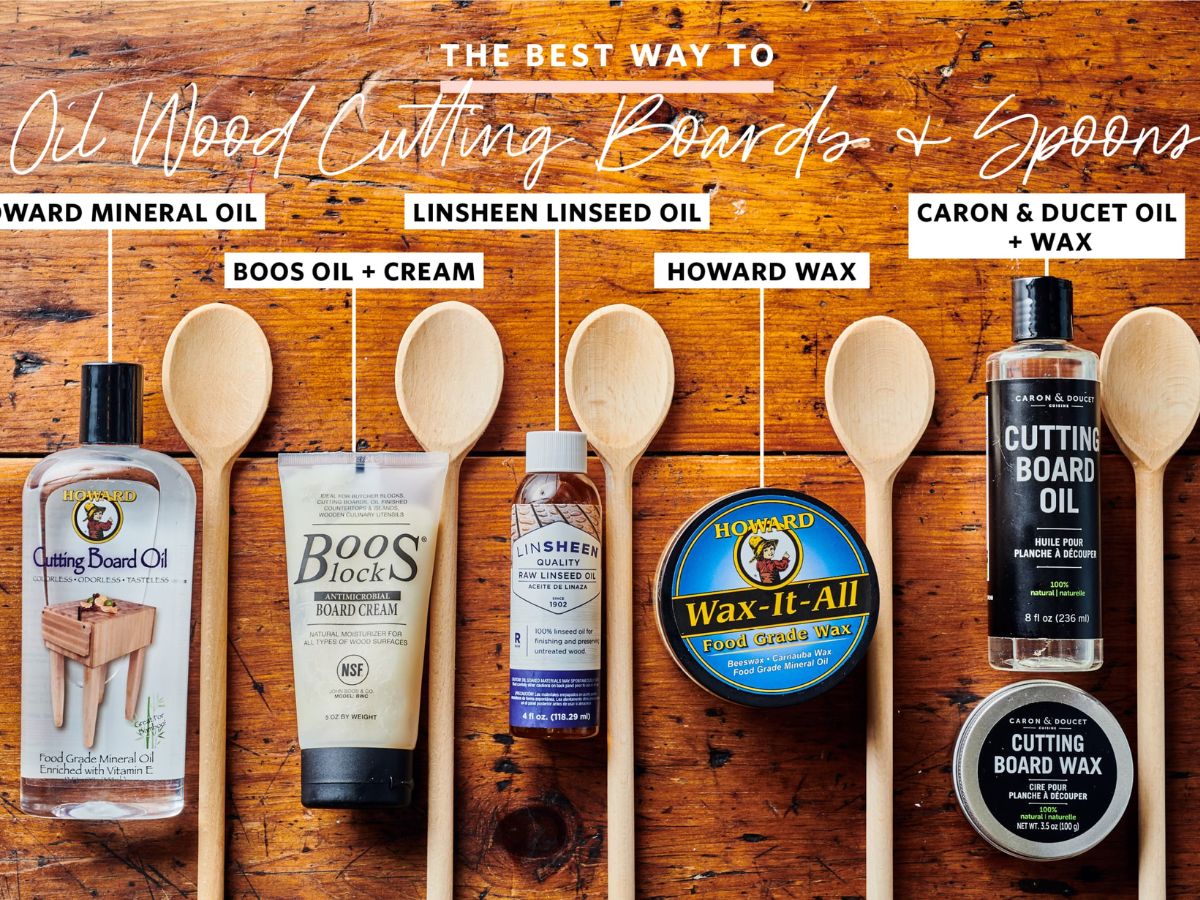
If you know how to clean wooden spoons and wooden utensils, taking care of them is equally important.
Caring for wooden utensils is essential to ensure their longevity and maintain their beauty and functionality over time. Proper care helps to preserve the natural properties of wood and prevents damage that can occur from exposure to moisture, heat, and other environmental factors. Here are some key tips for caring for wooden utensils to ensure their longevity:
- Season Regularly: Wooden utensils benefit from regular seasoning to maintain their finish and prevent drying or cracking. Food-safe oils, such as mineral oil or coconut oil, can be applied to the utensils using a clean cloth. Allow the oil to penetrate the wood for several hours or overnight, then wipe off any excess oil before using the utensils.
- Avoid Soaking: Wooden utensils should never be soaked in water or left submerged for extended periods. Prolonged exposure to water can cause wood to swell, warp, or develop mold. Instead, wash wooden utensils by hand using mild dish soap and warm water, and dry them immediately after washing.
- Store Properly: Store wooden utensils in a dry, well-ventilated area away from direct sunlight and heat sources. Avoid storing them in drawers or containers where they may be exposed to moisture or trapped in a humid environment. Consider hanging utensils on a utensil rack or storing them upright in a utensil clock to allow for proper airflow.
- Inspect Regularly: Regularly inspect wooden utensils for signs of wear, damage, or mold growth. Discard any utensils that are cracked, splintered, or heavily stained, as they may pose a health risk. Sand down any rough or splintered surfaces using fine-grit sandpaper, then reapply a thin layer of food-safe oil to restore the finish.
- Use as Intended: Use wooden utensils for their intended purposes and avoid using them with acidic or highly pigmented foods, as these can stain or damage the wood. Consider designating separate utensils for different types of foods to prevent cross-contamination.
- Clean Regularly: Clean wooden utensils after each use to remove food residue and prevent bacterial growth. Wash them by hand using mild dish soap and warm water, then rinse thoroughly and dry immediately. Avoid using harsh detergents or abrasive cleaners, as they can strip the wood's natural oils and damage the surface.
By following these tips for caring for wooden utensils, you can ensure that they remain in excellent condition for years to come. Proper care and maintenance are essential for preserving the beauty, functionality, and longevity of wooden utensils, allowing you to enjoy them in your kitchen for many culinary adventures.
Read this article: The best unique handmade spoon and fork collection of 194 Craft House
Additional Tips and Best Practices for Wooden Utensil Care
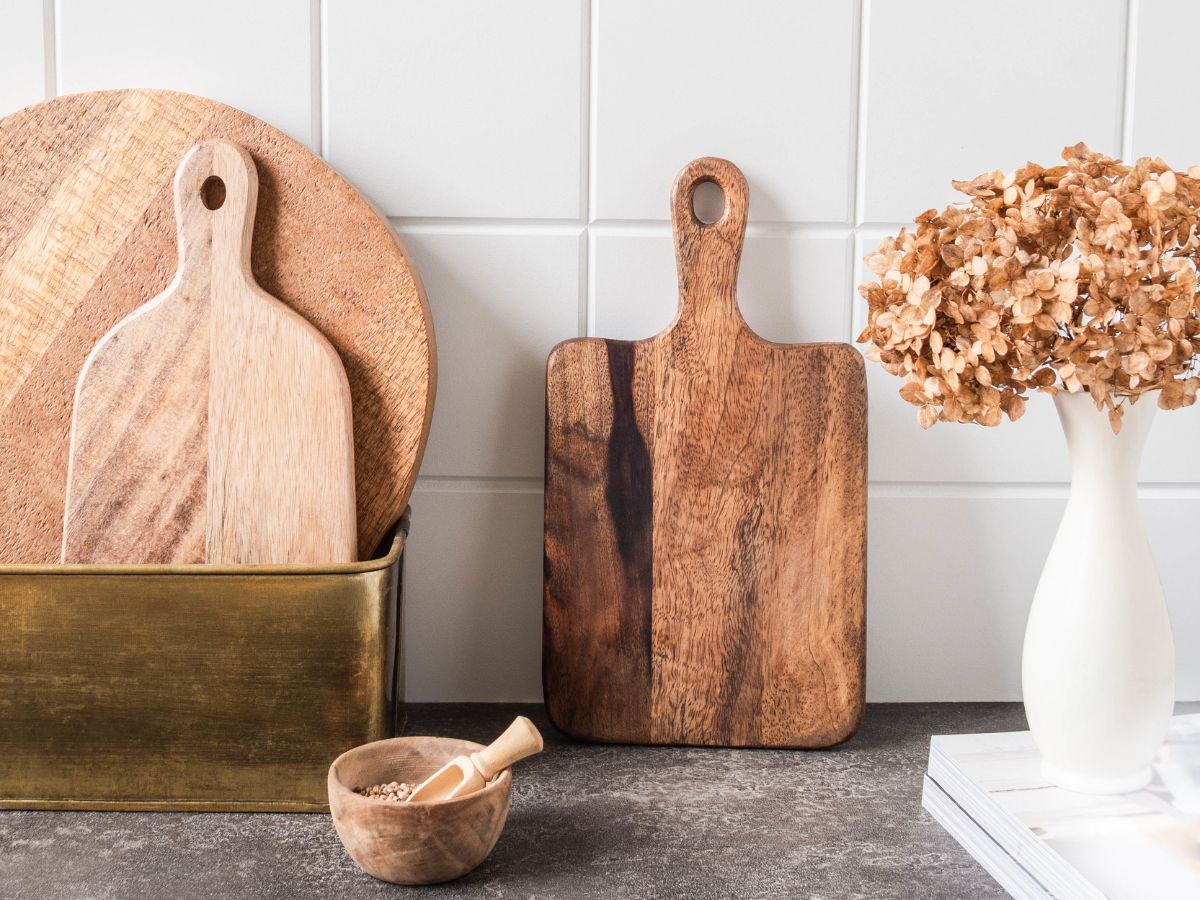
In addition to the fundamental care practices outlined earlier, here are some additional tips and best practices for caring for wooden utensils to ensure their longevity and optimal performance in the kitchen:
- Avoid Extreme Temperatures: Exposure to extreme temperatures can cause wooden utensils to warp, crack, or split. Avoid leaving utensils near heat sources such as stovetops, ovens, or dishwashers. Similarly, refrain from storing them in cold or damp environments such as refrigerators or freezers, as this can also damage the wood.
- Reapply Seasoning as Needed: Over time, the protective layer of seasoning applied to wooden utensils may wear off with use. Monitor the condition of your utensils regularly and reapply seasoning as needed to maintain their finish and prevent drying or cracking. Seasoning can be reapplied using food-safe oils or waxes, following the same process as the initial seasoning.
- Rotate Utensils in Use: To distribute wear and tear evenly among your wooden utensils, consider rotating them in use regularly. Using the same utensils for every cooking task can lead to uneven wear and potential damage. Rotate utensils periodically to ensure that they all receive equal use and maintain their condition over time.
- Handle with Care: Wooden utensils are durable, but they still require gentle handling to prevent damage. Avoid dropping or banging utensils against hard surfaces, as this can cause splintering or cracking. Handle utensils with care during use and cleaning to prolong their lifespan and maintain their appearance.
- Monitor for Signs of Wear: Keep an eye out for signs of wear and tear on your wooden utensils, such as scratches, dents, or discoloration. Address any issues promptly by sanding down rough areas and reapplying seasoning as needed. Regular maintenance helps to prevent minor issues from escalating into more significant problems.
- Use Wood-Safe Cleaners: When cleaning wooden utensils, opt for cleaners specifically formulated for wood surfaces. Avoid using harsh chemicals or abrasive cleaners, as these can damage the wood and strip away its natural oils. Choose gentle, wood-safe cleaners that effectively remove food residues without compromising the integrity of the utensils.
- Rotate Storage: Periodically rotate the storage location of your wooden utensils to prevent prolonged exposure to sunlight or moisture. Direct sunlight can cause fading or discoloration over time, while excessive moisture can promote mold growth. Rotate utensils to different storage areas to ensure that they remain in optimal condition.
- Reevaluate and Replace: Regularly reassess the condition of your wooden utensils and consider replacing any that show significant signs of wear or damage. While wooden utensils are durable, they have a finite lifespan and may need to be replaced over time. Investing in high-quality replacements ensures that you continue to enjoy the benefits of wooden utensils in your kitchen.
By incorporating these additional tips and best practices into your wooden utensil care routine, you can maintain their longevity, appearance, and performance for years to come. Proper care and maintenance are essential for preserving the natural beauty and functionality of wooden utensils, allowing you to enjoy them in your kitchen for countless cooking adventures.
Conclusion
Proper cleaning and care are essential for maintaining the beauty, functionality, and hygiene of wooden utensils in the kitchen. By following the step-by-step guide and best practices outlined in this article, you can ensure the longevity of your wooden utensils and enjoy safe and enjoyable cooking experiences for years to come.






